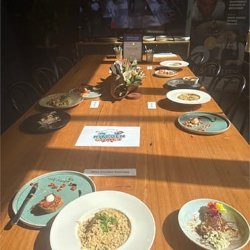




(The photos show the occupancy percentages for the intensive care units in each state across five regions of Brazil. April 12)
At the end of March, occupancy of Unidade de Terapia Intensiva (UTI = Intensive Care Units) was over 90% in the capital Brasilia and 16 other states. The situation still hasn’t changed.
In fact, recently some people I know have gotten the virus, so I no longer feel as though it’s someone else’s business. And I feel more inclined than before to stay at home. Of course, a state of emergency was declared for three weeks in São Paulo State from the end of March, and various restrictions have been put in place. In addition to a curfew from 8 p.m. to 5 a.m. the following day, masks must be worn outdoors as well as indoors, and the closing time for essential businesses such as pharmacies, supermarkets, bakeries, etc. has been set at 8 p.m. For other shops, you can only buy online or at a drive-through, you can’t use the parks or beaches, and sports activities are prohibited, as are religious events and activities in groups. Companies and schools are online only. Even after 8 p.m., however, the streets are not deserted, and it isn’t until about 10 p.m. that things quieten down. You can see on the news there are still lots of people coming and going in the central part of São Paulo City, and there are still people who don’t wear masks. When a reporter asked a woman who wasn’t wearing a mask for the reason, the woman replied on camera, "It's my choice to die, right?" There are COVID-19 deniers who don’t believe at all in the need for masks or vaccination. If you thought no one would be out at night because of the emergency situation, it seems you’d be wrong, and in the State of São Paulo, a police crackdown on illegal parties dealt with more than 716 parties between the end of February and the end of March. The young people who go to illegal parties say they're just having fun drinking and dancing with their friends. Some of those young people know people who got COVID-19 and died. So, despite that, why do they carry on?
It could be that so many Brazilians aren’t following the restrictions because President Bolsonaro is not enforcing stringent measures against COVID-19. In addition, people in classes C and D (under the Brazilian social class system) live in the now, they eat today with the money they earn from working today. That's the reality, and it's also true that they don’t pay much attention to what's going on in the world. Another reason might be that last year the authorities were saying there was little danger for younger people, even if they get COVID-19.
When it comes to avoiding trips outside the home as much as possible, working from home, and taking school classes online, Brazil is still a developing country. The gap between rich and poor is big, there are many people who cannot eat without work, and some people don’t have a computer (According to a 2019 survey, 26% of Brazilians don’t have internet access). In some families, everyone lives all together in one small house. The support people get from the government isn’t enough to eat. The country is large, and the population is high, which makes it more difficult to deal with this pandemic.
It’s important to vaccinate people as soon as possible. Vaccination started at the end of January this year for elderly people over 90 years, doctors, and nurses, and now vaccination has started for people in their early 60s. With vaccination for people in their 50s starting in May, the pace is slow, but things are progressing. We can only pray that as well as the vaccines, a drug that inhibits COVID-19 from reproducing will be available soon.
I hope you all take good care of yourselves.




















































